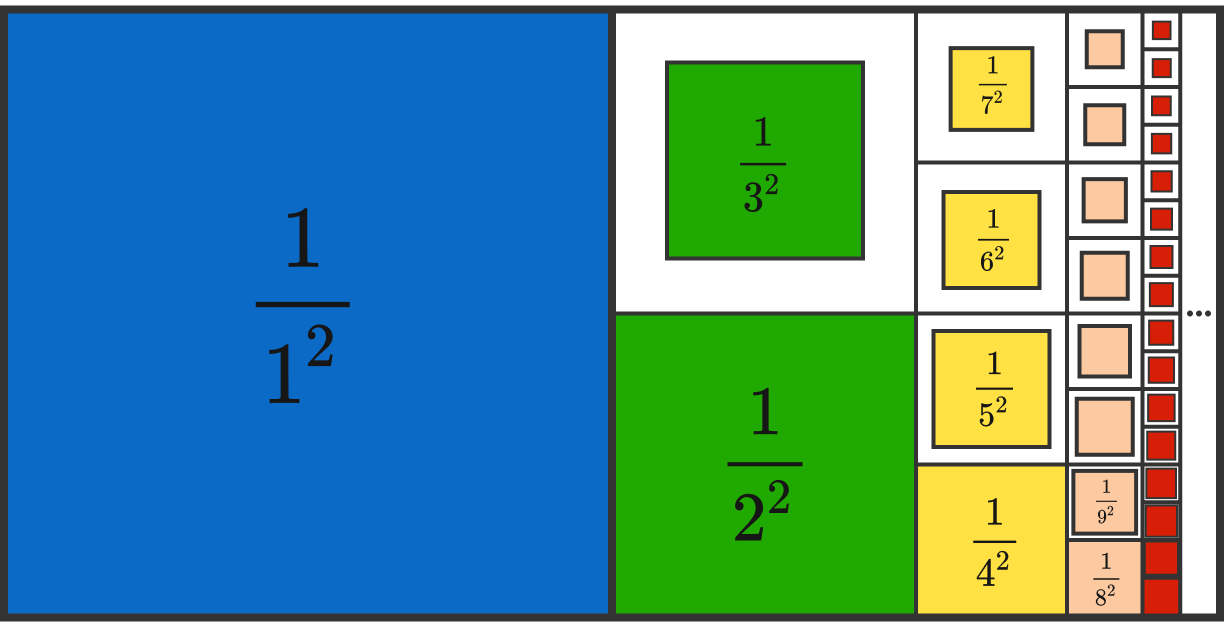Reciprocal Sums
It is known that 1 1 + 2 1 + 3 1 + ⋯ is infinite.
What about
1 2 1 + 2 2 1 + 3 2 1 + ⋯ ?
Hint:

This section requires Javascript.
You are seeing this because something didn't load right. We suggest you, (a) try
refreshing the page, (b) enabling javascript if it is disabled on your browser and,
finally, (c)
loading the
non-javascript version of this page
. We're sorry about the hassle.
3 solutions
It's f i n i t e and also < 2
Why?
Let's denote S = 1 2 1 + 2 2 1 + 3 2 1 + . . . . .
Now let's write down some comparisons:
On the LHS we shall write elements of S and on the RHS we shall put elements of the image presented.
Blue: 1 2 1 = 1
Greens: 2 2 1 + 3 2 1 < 2 1
Yellows: 4 2 1 + 5 2 1 + 6 2 1 + 7 2 1 < 4 1
And the general case: ( 2 N ) 2 1 + ( 2 N + 1 ) 2 1 + ( 2 N + 2 ) 2 1 + . . . ( 2 N + 1 − 1 ) 2 1 < 2 N 1
Now if we sum all the LHS and all the RHS then we get S < 1 + 1/2 + 1/3 + ¼ + …. < 2
The only thing that's left is to prove the 'general case' above.... -
Let's write down the 2 N element:
( 2 N ) 2 1 = 2 2 N 1
( 2 N + 1 ) 2 1 < 2 2 N 1
( 2 N + 2 ) 2 1 < 2 2 N 1
.....
( 2 N + 1 − 1 ) 2 1 < 2 2 N 1
If we add them up then we get the 'general case'
( 2 N ) 2 1 + ( 2 N + 1 ) 2 1 + ( 2 N + 2 ) 2 1 + . . . ( 2 N + 1 − 1 ) 2 1 < 2 2 N 1 + 2 2 N 1 + . . . + 2 2 N 1 = 2 N 1
Can we find it's exact value?
@Aviel Livay I couldn't understand 'FINITE' , isn't the series INFINITE??
Log in to reply
It's finite :) if you add more and more members of this series you are gonna end up with a number and we know that this number is smaller than 2.
Log in to reply
Okay, I know that the number is less than 2 , but how is it finite? Isn't it that we can reach upto infinite terms ?
Log in to reply
@Ankit Kumar Jain – You are asked about the value of the sum, not about the number of terms.
The value of the sum is finite. The number of terms is infinite.
The series is an Infinite one, but the solution for its VALUE for an infinite number of factors n & n--- >oo, is Finite, which means it Converges to a constant value.
Ohhh sorry, I did not notice that the question was already answered!
Consider the sum :
S = 1 × 2 1 + 2 × 3 1 + 3 × 4 1 + ⋅ ⋅ ⋅ .
S = 1 − 2 1 + 2 1 − 3 1 + 3 1 − 4 1 + 4 1 ⋅ ⋅ ⋅
⇒ S < 1 .
2 2 1 < 1 × 2 1
3 2 1 < 2 × 3 1
4 2 1 < 3 × 4 1 and so on.
⇒ 1 > S > 2 2 1 + 3 2 1 + 4 2 1 + ⋅ ⋅ ⋅
⇒ 2 > S + 1 > 1 2 1 + 2 2 1 + 3 2 1 + 4 2 1 + ⋅ ⋅ ⋅
I like your explaination
As shown in the diagram:
S = 1 2 1 + 2 2 1 + 3 2 1 + 4 2 1 + 5 2 1 + 6 2 1 + 7 2 1 + 8 2 1 + . . . < 1 2 1 + 2 2 1 + 2 2 1 + 4 2 1 + 4 2 1 + 4 2 1 + 4 2 1 + 8 2 1 + . . . < 1 1 + 2 1 + 4 1 + 8 1 + . . . = 1 − 2 1 1 = 2
Therefore, it is finite and less than 2 .